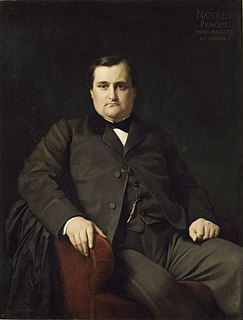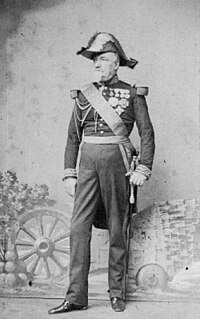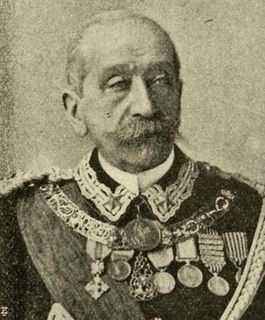 W
WLudwig August Ritter von Benedek, also known as Lajos Benedek, was an Austrian general (Feldzeugmeister) of Hungarian descent, best known for commanding the imperial army in 1866 in their defeat at the Battle of Königgrätz against the Prussian Army, which ended his career.
 W
WNapoléon Joseph Charles Paul Bonaparte, usually called Napoléon-Jérôme Bonaparte or Jérôme Bonaparte, was the second son of Jerome, King of Westphalia, youngest brother of Napoleon I, and his second wife Catharina of Württemberg. An outspoken liberal, he became the de facto head of the House of Bonaparte from 1879 to his death. He was not considered a legitimate pretender to the throne by many Bonapartists, due to his father's previous marriage without divorce. They instead preferred his son Victor. From the 1880s he was one of the stronger supporters of General Georges Boulanger, together with other monarchist forces.
 W
WCount Raffaele Cadorna was an Italian general who served as one of the major Piedmontese leaders responsible for the unification of Italy during the mid-19th century.
 W
WJacques Camou was a French general in the armies of Emperor Napoleon III.
 W
WEnrico Cialdini, Duca di Gaeta was an Italian soldier, politician and diplomat.
 W
WEnrico Cosenz was an Italian soldier born at Gaeta.
 W
WGiovanni Durando was an Italian general and politician.
 W
WGiuseppe Maria Garibaldi was an Italian general, patriot and republican. He contributed to the Italian unification and the creation of the Kingdom of Italy. He is considered one of the greatest generals of modern times and one of Italy's "fathers of the fatherland", along with Camillo Benso, Count of Cavour, Victor Emmanuel II of Italy and Giuseppe Mazzini. Garibaldi is also known as the "Hero of the Two Worlds" because of his military enterprises in South America and Europe.
 W
WCount Ferenc Gyulay de Marosnémethi et Nádaska, also known as Ferencz Gyulai, Ferencz Gyulaj, or Franz Gyulai, was a Hungarian nobleman who served as Austrian Governor of Lombardy-Venetia and commanded the losing Austrian army at the Battle of Magenta.
 W
WAlfonso Ferrero La Marmora was an Italian general and statesman. His older brothers include soldier and naturalist Alberto della Marmora and Alessandro Ferrero La Marmora, founder of the branch of the Italian army now called the Bersaglieri.
 W
WJoseph Édouard de La Motte-Rouge' was a French general and politician.
 W
WWilhelm Freiherr von Ramming von Riedkirchen was an Austrian Feldzeugmeister who commanded an army corps during the Austro-Prussian War.
 W
WAlessandro Asinari di San Marzano was an Italian politician, general, and Senator of the Kingdom of Italy
 W
WZisis Sotiriou was a Greek revolutionary of the Greek War of Independence.
 W
WPhilipp Franz Emerich Karl von Stadion und Thannhausen was an Austrian feldmarschall-leutnant and Landkomtur of the Teutonic Order in Austria.
 W
WJean-Jacques Alexis Uhrich, was a French général de division. He was the great uncle of Général d'armée Maurice Gamelin (1872–1958). Military governor of the city of Strasbourg in 1870, Uhrich is best known for his service during the Franco-Prussian War (1870–1871) as the commander of French forces during the Siege of Strasbourg and for surrendering the city to German forces.
 W
WThomas Friedrich Zobel von Giebelstadt und Darstadt was an Austrian military officer.